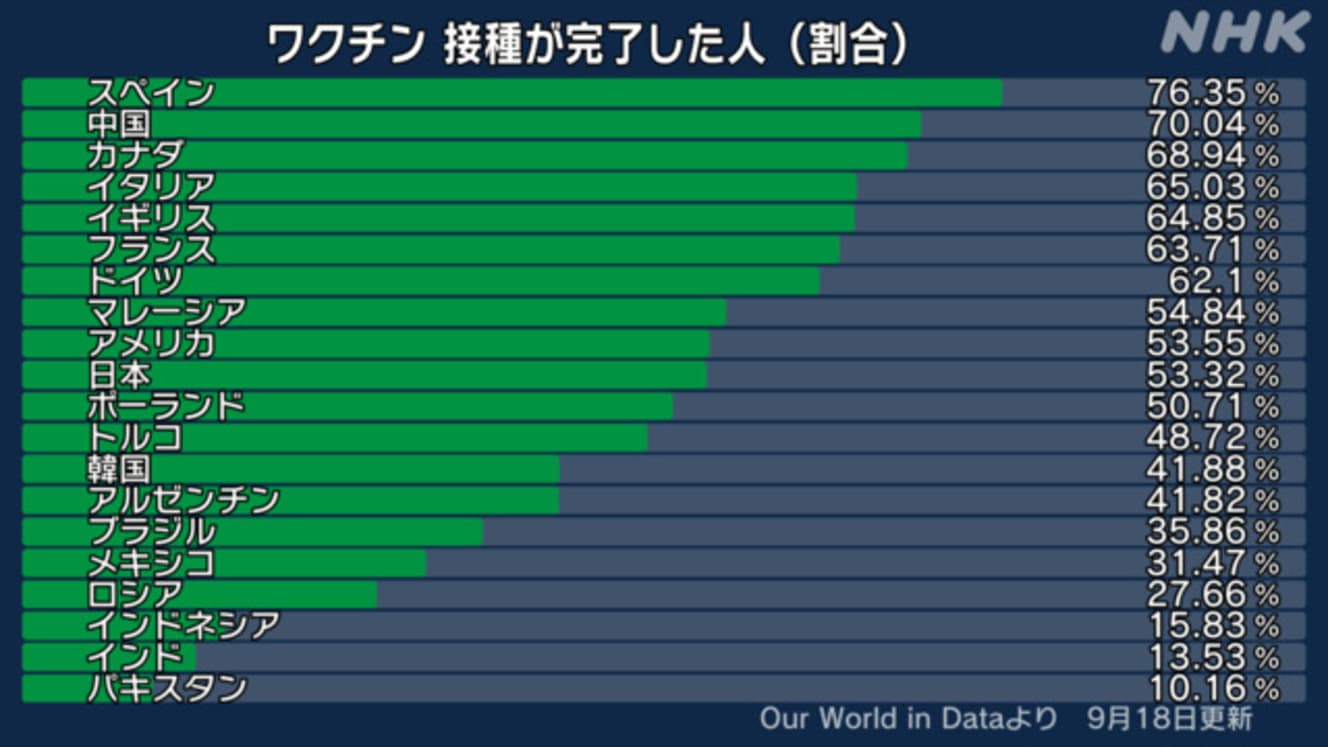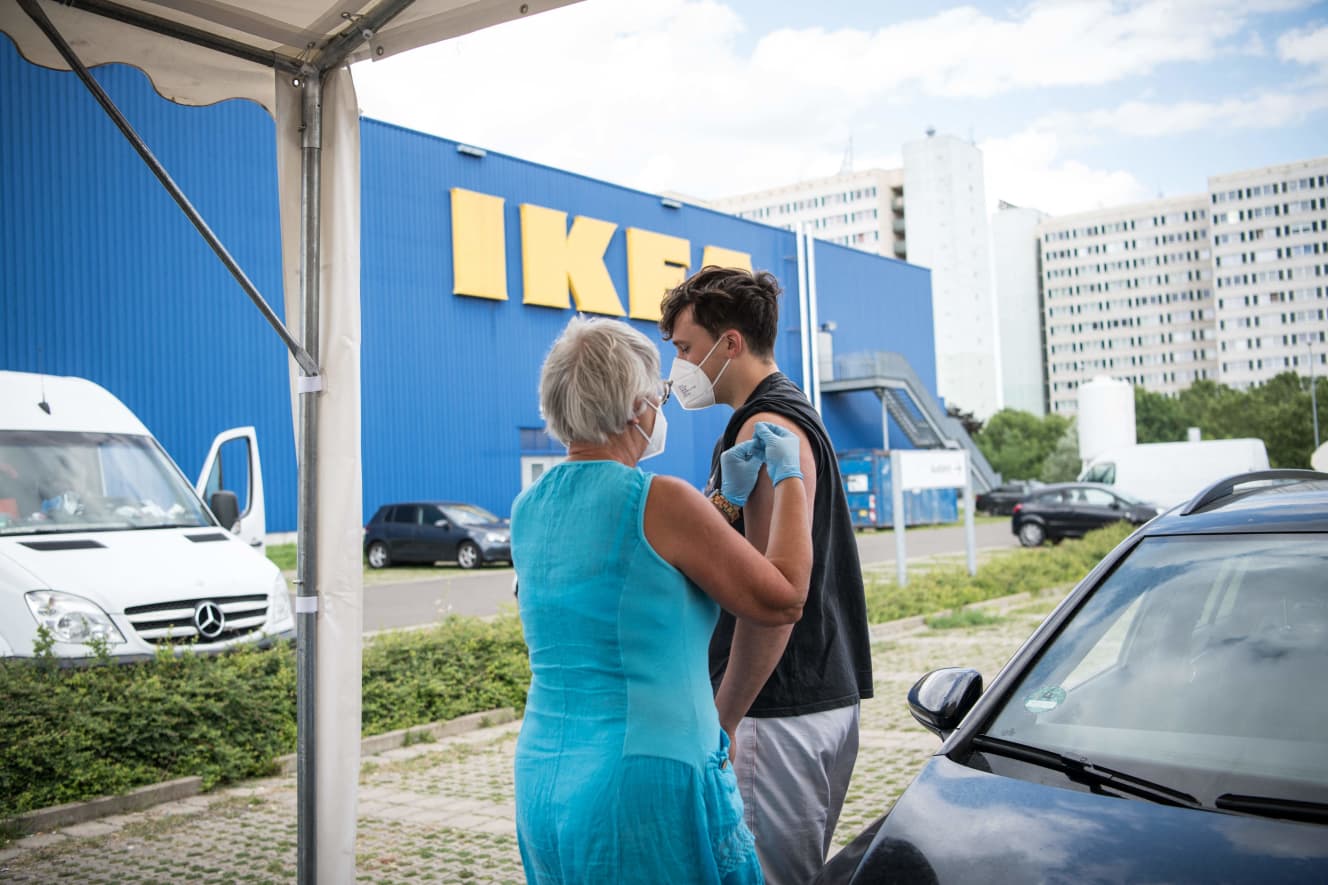What Germany, a de facto mandatory vaccine society, can teach us about Japan’s future
On April 13, the Japanese government announced that the number of people who have completed two doses of vaccination against the new coronavirus has exceeded half of the Japanese population. Germany, where the percentage of people who have received two doses of the vaccine is about 10% higher than in Japan, has launched a measure to create a “de facto mandatory vaccine society. Ms. Yoshiko Ryoukai, who lives in Germany, predicted “Japan’s future” based on what she sees in “Germany today.
New coronary heart disease tests to be charged from October
On August 10, the German government made a big splash when it announced that it would discontinue offering free tests for new coronas on October 11 in order to promote vaccination against new coronas.
In Germany, tests are considered important anyway, and among the new coronas tests, antigen tests have been provided free of charge. Antigen tests and PCR tests are available at pharmacies and private laboratories, and in urban areas there are as many or more laboratories than convenience stores in Japan.
The antigen test is also called a rapid test, and the results can be obtained in as little as a few minutes. The test is done by taking a sample from the mucous membranes at the back of the nose or inside the cheeks. It takes only a few tens of seconds to complete. The results are received via e-mail or short mail, and the data can be shown in the store or imported into an app. It is very easy and simple.
The test sites are often located next to restaurants in downtown areas, so you can take the test results with you to the restaurant. The test results are valid for 48 hours. Charging for the antigen test is virtually the same as requiring a vaccine.
(The vaccine will continue to be offered free of charge to children, pregnant women, and those who cannot be vaccinated due to pre-existing conditions.

In Germany, various quarantine measures are determined based on the 7-day index, which refers to the number of new infections per 100,000 people in the past 7 days, and as of September 13, the overall figure for Germany was 81.9.
Restrictions on behavior depend on each state’s regulations, but in the case of North Rhine-Westphalia (NRW), the capital of which is Dusseldorf, known for having one of the largest Japanese communities in Europe, the 3G rule, which applies if the 7-day index is 35 or higher, is currently in effect.
3G is an acronym that stands for vaccinated person (geimpfte), person who has recovered from infection (genesene), and person who has a negative coronary test result (getestete). The term ” 2G” refers only to those who have been vaccinated and those who have recovered. The status of vaccine intake is managed either through a handwritten booklet or a cell phone application. This can also be done visually by the store or by scanning a QR code.
Under the 3G rule currently in effect, there are no behavioral restrictions for vaccinated and convalescents (2G); for those who do not fall under 2G, a negative antigen test is required for indoor events, indoor parts of restaurants, beauty salons, massage parlors, hotels, and large outdoor events with more than 2,500 people. For clubs and discos, a negative PCR test is required instead of an antigen test, and for nursing homes and hospitals, 3G is required even if the 7-day index is less than 35.
School-going children and students are required to be tested twice a week at school, so they are considered to have been tested, and must show proof of school attendance to prove 3G. Wearing a mask is not required for outdoor use, but is still mandatory for indoor use, even for 2G. Only medical surgical masks or FFP2 masks are allowed, and if you wear a urethane mask like those prevalent in Japan, you will not be able to enter supermarkets or ride trains.
As you can see from the above, it takes some time and effort to get tested, but as long as the antigen test is free, there are almost no restrictions on activities that would cause inconvenience in daily life. The lockdown in Germany, which started last November, has not been completely lifted, but the country cannot afford to take any more measures to control the spread of the disease, such as closing restaurants and stores, and is just trying to increase the vaccination rate.
At the time the fee for antigen testing was announced, only about 55 percent of the population had been vaccinated, but now 62.2 percent (72.9 percent of those over 18) have been vaccinated.

Complete freedom is coming soon…
In the run-up to the introduction of the fee-based antigen test, restrictions on the activities of the unvaccinated have been gradually introduced.
In the Bundesliga, Cologne and Dortmund have limited the number of visitors to 2G, and FC Cologne has obtained a permit from the NRW health ministry for a capacity of 25,000, half of the stadium’s maximum capacity of 50,000 and the largest under current rules. Dortmund has also adopted the 2G system, with 25,000 people in attendance on August 27. The mayor of Dortmund, Thomas Westphal, has asked the NRW health ministry to restrict leisure activities, such as movies and restaurants, to 2G.
NRW Health Minister Karl-Josef Laumann has rejected the request, but the Ruhrnahallichten newspaper reports that some cities have expressed similar intentions. Frankfurt, where Makoto Hasebe and Daichi Kamata play, has been allowed 25,000 spectators, of which 5,000 are 3G and the remaining 20,000 are 2G only.
At present, only Cologne and Dortmund have 2G stadiums, but if the number of vaccinated people increases and it is judged that ticket revenue will not be a problem even if the stadiums are limited to 2G, it is natural to expect that the number of stadiums with 2G will increase. In addition, even though these events took place at a soccer stadium, no one can say that they will not encroach on our daily lives in the future.
The price of the antigen test will become a concern. Currently, a subsidy of 11.5 Euros (1495 yen) per antigen test and 43.56 Euros (5662 yen) per PCR test is paid to the laboratories (at one time, some laboratories embezzled this subsidy and it became a big problem).
Based on this amount of money, the antigen test is likely to settle at around 15 to 20 Euros (1950 to 2600 yen). The PCR test, which is still basically done for a fee, costs between 55 and 120 Euros (7,150 yen to 15,600 yen ), depending on how long it takes to get the test results. The self-test is available at supermarkets, drugstores, and pharmacies for about 5 Euros (650 yen).

I don’t know how many times I had to take the antigen test before I was vaccinated. However, once the vaccination is complete, there is no need to ask for the results of the antigen test in Germany, and I can’t imagine any situation in which I would be affected by the new fee.
On the other hand, you will always be asked for proof of vaccination at restaurants, cafes, movie theaters, and soccer fields where you are interviewed. While you can enter anywhere with proof of vaccination, without it, you feel as if you can do almost nothing. On the other hand, if you are unvaccinated, you cannot go to watch soccer in Dortmund or Cologne, for example, as mentioned above.
Also, there are not a few 2G proponents besides the mayor of Dortmund. Recently, in Berlin, it has become possible for organizers to choose 2G in restaurants, zoos, and events. Many other states are already considering the introduction of 2G, and it is likely to spread further in the future. While this will increase the sense of security for infection control, it will also deny those who do not want to be vaccinated from the start.
In Japan, as vaccination rates have increased, there have been reports that the government plans to ease restrictions on activities. From what I’ve read in the press, it seems that various requests to facilities, restaurants, and events will be eased, and the number of diners and travel restrictions that have been asked of individuals will basically be approved by 3G.
From now on, it will be a must for each individual to carry his or her vaccination status or test results, either in physical or data form, at all times and present them as necessary. It is unacceptable to say that you cannot present this information because it is personal information. Even a young girl in Germany who said she was “anti-vaccine” is afraid of the inconvenience, saying, “I’ll take it after all. If there is a shift from 3G to 2G in Japan, I imagine that unvaccinated people in Japan, where there is a strong peer pressure, will feel a little uncomfortable.
Even though vaccines have become much more widespread, we are still far from complete freedom. In addition, although domestic regulations have been eased, there are still many countries where waterfront measures are strictly limited. In the end, we are still a long way from talking about a post-Corona world.
Reporting and writing: Yoshiko Ryokai
Born in Saitama Prefecture in 1975. Graduated from the Department of History, Faculty of Letters, Japan Women's University, and began reporting on soccer in 2001, and became a writer after covering the 2003 World Youth Cup (now the U-20 World Cup) in the UAE. Has covered four World Cups and three Summer Olympics, and has been living in Dusseldorf, Germany since March 11, 2011.
